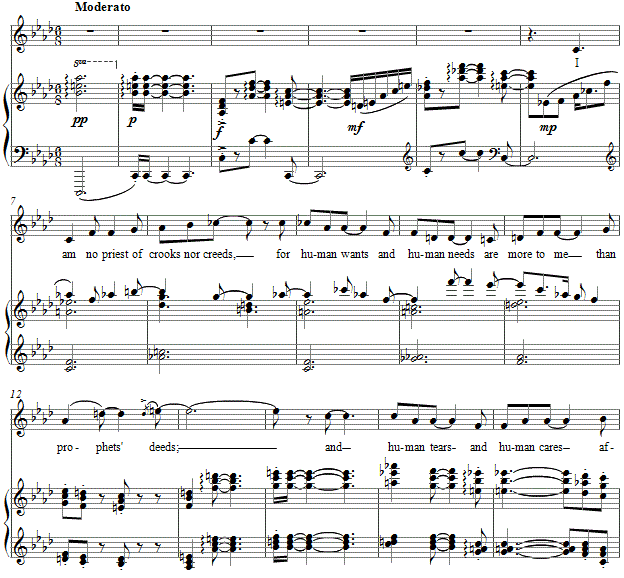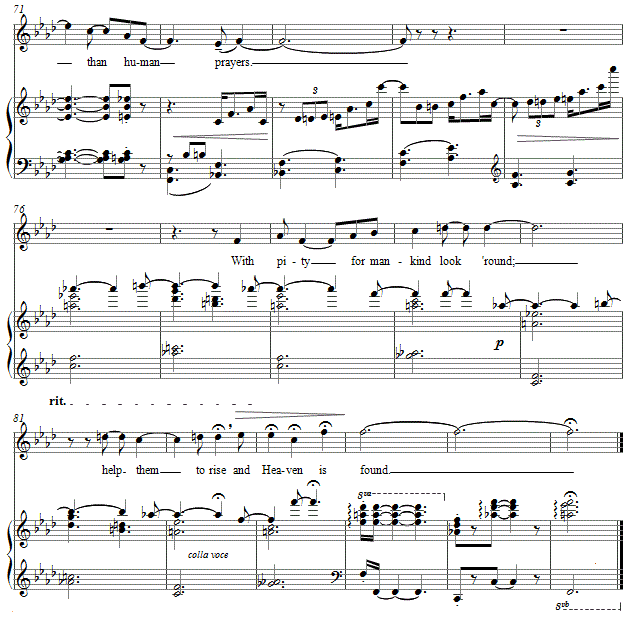Music and Texts of GARY BACHLUND
Vocal Music | Piano | Organ | Chamber Music | Orchestral | Articles and Commentary | Poems and Stories | Miscellany | FAQs
Creed and not a Creed - (2011)
Paul Laurence Dunbar
for medium or high voice and piano
I am no priest of crooks nor creeds,
For human wants and human needs
Are more to me than prophets' deeds;
And human tears and human cares
Affect me more than human prayers.
Go, cease your wail, lugubrious saint!
You fret high Heaven with your plaint.
Is this the "Christian's joy" you paint?
Is this the Christian's boasted bliss?
Avails your faith no more than this?
Take up your arms, come out with me,
Let Heav'n alone; humanity
Needs more and Heaven less from thee.
With pity for mankind look 'round;
Help them to rise--and Heaven is found.4 pages, circa 2' 45"
Paul Laurence Dunbar
The text is taken from Dunbar's collection of poems, Majors and Minors, 1895, Hadley & Hadley, Printers and Binders, Toledo, Ohio.
A personal editorial on the 31st of December 2011:
Thinking of the pompous assertions of the last decades in which religious creeds advocating political solutions through government and the often-atheistic creed of politics as well -- a form of secular belief system to my sense of things, and therefore a religion in of itself --have been advanced as answers to social ills, they all have proving little or real and permanent solutions. This challenging text by Dunbar speaks wonders from a century and more ago.
From Venezuela's Chavez' assertion that "Jesus was a socialist" coupled to his twelve fumbling years in power in which businesses have been nationalized all the while poverty increases, inflation rages and crime is so rampant that Venezuela's capital of Caracas is among the most murder-ridden in the world today, the "Christian's boasted bliss" is a particularly apt line as Dunbar forms it. True pity, not the official yet unpitying "pity" of most every state and its government, is what lifts its hand freely, individually and charitably to answer the woes of men, one at a time.
The same might be observed in Mugabe's Marxist Zimbabwe in which the apparent once-upon-a-time answer to racist apartheid has bred massive unemployment of those black Africans which specifically the Marxist party purported to help, alongside almost-impossible-to-describe inflation. Dunbar asks us with a voice echoing from over a century ago, "Avails your faith no more than this?" While the various forms of socialist politics worldwide scream "yes" in their orthodox passion for theory unsupported reality, the demonstrable fact is that waste and corruption seem endemic to the nature of "crooks and creeds" alike. The American poet, Sandburg, was among those to also notice this.
In the same way in the United States, one finds the "one percent" claim by some politicians backfiring, as news becomes widespread that among the "rich" are most members of Congress and in both political parties, not to mention successive administrations' dramatis personae, lobbyists and more, proving that Dunbar's line, "help them to rise" seems to be far better a measure of the increase in politicians' rising wealth than in the poor classes. Moreover one notes that stories in the news proclaim that under such social "creeds," poverty in America increases while debt spirals to unimaginable heights without serious discussion by any of the major parties thereto.
Similarly in Germany, the chancellor suggested "haircuts" -- loss of principal -- for investors in government bonds whose promise seems unlikely to be kept, and then Europe wonders why further subscription of private money into public debt is shrinking quickly. Moreover it is an obvious and basic fact of arithmetic that when one -- individual or state -- is in massive debt, the pursuit of social justice is hindered or soon will be by the simple insolvency of such a fiscal position. Most social welfare states are learning this in real time, as one watches Greece's travails or examines the newest austerity budget enacted by Spain. The same is true for states within the Chinese nation, in which insolvencies are becoming bankruptcies.
This all is called a "financial crisis," but in fact it is worldwide the consequences of government creeds and those religious stances which support them, whether tinged with Chavez' Christian socialism or North Korea's cult of personality coupled to persistent starvation, now all in its third dictatorial generation. What form of freedom finds the same "leaders" in power for as much as sixty years? Especially when prosperity is a word unknown in these experiments in government and religious stances which propose such forms of government?
It seems rather clear that one political stance has created wealth for the many and built middle classes around the world, and that has been demonstrably and basically freedom.
For this the 1920's poet German socialist poet, Mühsam, correctly foresaw an ideal time in which society was liberated -- from the state. This is a crucial distinction.
I imagine Dunbar would have found agreement in this notion, for to leave "Heaven alone" is also to leave "creed" and corruption alone, as the socially-responsible individual can help others to "rise" through simple human interactions, as business tradition often of late has called the win-win situation. This happens when freedom reigns, not when "crooks nor creeds" and indeed even the "priests" of these men do not reign as sovereigns. Freedom can be sovereignty enough when individual rights and responsibilities are respected. May this new year's turning -- the day on which I completed this setting -- further this awareness. Who shall argue against freedom? Among them, tyrants and slave owners....
The setting is based on only a few chord forms, the major-minor seven chord and the more dissonant yet related chords as seen in measures 8 and 10. Yet these function as progressions, the 6/8's light syncopation swinging over their changes. The form is a simple verse form, the second marked simply as being more "insistent."
The small coda allows the restatement of the poet's opening lines coupled to his charge that we "help them to rise." The setting ends quietly, and the voice is marked with a diminuendo, as the poet's tells us that by this act, there and not in some coercive utopia. whether Marxist or theocratic or secular -- that "Heaven is found."
The score is available as a free PDF download, though any major commercial performance or recording of the work is prohibited without prior arrangement with the composer. Click on the graphic below for this piano-vocal score.


